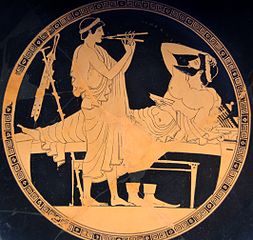
June 12, 2014, by Richard Rawles
Beginnings and Endings (77)
And another thing…
A few weeks ago I posted about beginnings and endings in ancient literature, and called the post ‘Beginnings and endings (1)’. So I must go on…
Sometimes the question ‘how can an ancient poem end?’ matters. One striking ending in a modern poem is Keats’ sonnet ‘On first looking into Chapman’s Homer’; this has been on my mind because first year literature students wrote a comparison of Chapman and a more recent translator’s account of the same lines from the Odyssey in their exam a few weeks ago. This poem tells of the new world opened up for the narrator by Chapman’s translation, and uses the idea of the explorer Cortez crossing central America and discovering… another ocean! Most strikingly, rather than returning to the idea of reading Homer, the poem ends with Cortez and his astonished men ‘silent, upon a peak in Darien’.
When a new papyrus allowed us to read Sappho’s song about Tithonus [scroll to the end for the translation], ten years ago, it seemed to show that Sappho’s song ended similarly. The narrator exhorts young women to sing and dance, says that she is too old for dancing and regrets this, and illustrates the inevitability of ageing with the example of Tithonus: even though the goddess Dawn loved him, and took him up to Olympus, still he grew old. As Keats ended with Cortez, so Sappho ended with Tithonus. Or did she?
Others have not read the poem this way, because they have argued that we should read four further lines, from a different papyrus (and a quotation – it’s complicated…) as belonging with the text from this papyrus. By this understanding, the poem might have ended by returning to the narrator and a world of delicacy and eros. Lowell Edmunds argued, strongly, that the evidence of other early poetry suggests that Sappho would not have ended a song with the Tithonus story; others in the same collection of essays suggest that the same song might have circulated in different versions, and draw wide-reaching conclusions about how we should edit early poetry. I was sceptical about this, and said so… but: how could a song of Sappho end?
And another thing…
What about beginnings? I talked before about how hard it is to know where to end or begin a work about history, whether epic poetry, or ‘proper’ prose history. The story could always start earlier, or end later. Ezra Pound’s Odyssean Canto 1 begins with the word ‘and’:
And then went down to the ship, Set keel to breakers, forth on the godly sea, and We set up mast and sail on that swart ship, Bore sheep aboard her, and our bodies also Heavy with weeping, […]Surely this strange sense of fragmentation, a beginning which is not a beginning, is a weird, modernist thing: could we find such a thing in an ancient text? Yes we could…
Historical narratives could always begin with the word ‘and’, and one history basically does. Thucydides’ Histories were unfinished: he must have meant to continue to the end of the war with Sparta in 404 BC. He didn’t, and Xenophon’s Hellenica presents itself as the continuation. It begins:
Μετὰ δὲ ταῦτα οὐ πολλαῖς ἡμέραις ὕστερον ἦλθεν ἐξ Ἀθηνῶν Θυμοχάρης ἔχων ναῦς ὀλίγας And after these things, not many days later, Thymochares arrived from Athens with a few shipsNor are ‘Greek works beginning with ‘and’ restricted to this. The Greek word δέ usually means ‘and’ or ‘but’. But we can find poems starting with ‘inceptive δέ’, especially in poems composed to be sung or recited at the symposion (an after-dinner drinking party). Here it seems as if one performer could take over from another: ‘Yes, and…’ is the start of a new song, responding to the previous singer.
What is your favourite beginning or ending of an ancient work? Suggestions welcome in the comments!
THE END YES VIVAM
Picture: Attic red figure cup showing performers at a symposion. Munich, Staatliche Antikensammlungen 2646.
https://commons.wikimedia.org/wiki/File:Symposion_scene_Staatliche_Antikensammlungen_2646.jpg Public domain.
No comments yet, fill out a comment to be the first

Leave a Reply